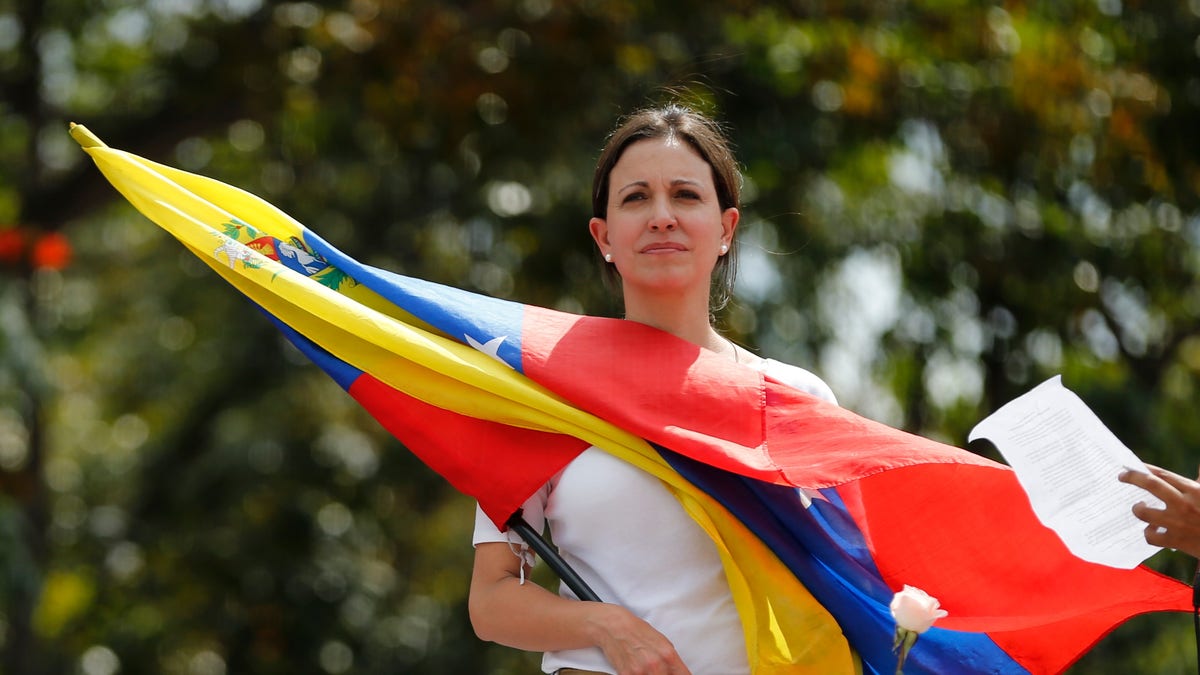
La líder opositora y congresista María Corina Machado participa de una marcha contra la represión de manifestantes ante el cuartel general de la Guardia Nacional en Caracas, Venezuela, el miércoles 26 de febrero de 2014. (AP foto/Fernando Llano) (ap)
Caracas, Venezuela – It was about 3 o'clock on the morning of May 8th, when hundreds of members of the Bolivarian National Guard and the Bolivarian National Police raided a tent camp in Caracas where hundreds of young demonstrators had settled down to attract the attention of the United Nations to Venezuela's democratic crisis.
The protesters were taken by surprise. Many of them awoke to the sound of the soldiers’ knives slicing through their tents. There was shouting and banging. There was panic.
Simultaneously, three other protest camps in Caracas were also dismantled. By sunrise, more than 240 people were arrested. It was, according to the NGO Foro Penal Venezolano, the biggest raid against demonstrators in the history of this South American country.
It also, according to experts in Venezuela, dealt a severe blow to the opposition movement in Venezuela – which now finds itself splintered and in disarray, unable to figure out its next move after drawing the world’s attention to conditions in Venezuela.
Three months after thousands of anti-government protesters took to the streets to rally against austerity measures – and after hundreds were arrested and 41 people died after a tough government crackdown on protesters – leaders of the opposition movement are now trying to figure out how to move forward.
“They are stuck in a dead end because some of its members played a strategy that drew people out to the streets believing that there would be a change of government, which has led to a situation of chaos and division within the opposition itself,” said Ángel Álvarez, a political science professor at the Andrés Bello Catholic University. “It's been a complete failure.”
On Tuesday, Washington lawmakers passed a Senate bill calling for the Obama administration to freeze the assets of high-level Venezuelan officials and bar them from entering the U.S. But even those sanctions, which still need to be approved by the full Senate, are receiving a tepid response from opposition leaders.
Opposition leaders are asking the Venezuelan government to free all political prisoners, disarm pro-government paramilitary groups and end media censorship.
Some more moderate members of the opposition began talks last month with Maduro’s government to try and reach a compromise – though the more hardliners were against negotiating with Caracas from the beginning. But the talks stalled sooner rather than later. Last Tuesday, opposition leader Ramón Guillermo Aveledo, executive secretary of the Democratic Unity Platform, announced a halt on the negotiations because of what they see as a lack of commitment from Nicolas Maduro's government to pursue any agreement.
According to professor Alvarez, the opposition did the right thing by putting the dialogue on hold. However, he said, even with the opposition playing hard ball, it would be difficult for them to make strong headway when the government has the upper hand and the opposition has no bargaining power.
“Nobody wants to give in,” he said. “If your opponent doesn't have enough power you give him as little as possible.”
Carmen Beatriz Fernández, managing director of DataStrategia, a consulting group, said it seems as if both sides will end up losing.
“Since the beginning of the protest, Venezuela got into a very negative dynamic: a lose-lose game. The government lost much of its international reputation up to the point that even close allies like [Brazil's former president, Luiz Inacio] Lula da Silva and Ecuador's president Rafael Correa are setting boundaries,” she said.
“But the opposition is also losing because it has shown its internal fractures; some of its main figures, like [opposition leader] Leopoldo López and two mayors, are in jail while they haven't been able to reap the support of many followers of deceased president Hugo Chávez who are unhappy with Maduro.”
Still, Fernández said that even when though the opposition’s main demands have yet to be achieved, the student movement has reached its goal of mobilizing and sensitizing Venezuela's society.
“Before the beginning of the protest, in Venezuela many people were without hope. They didn't have the spirit required to demonstrate against the government, only a few believed that we could make things move. Now this has changed completely,” student protester Daniel Yabrudy, president of the student's council of the Simón Bolívar University, said proudly.
The architecture student said the protesters have been successful in showing the world how the Venezuelan government flagrantly abuses civil rights and is out to violently quash free speech.
“The whole world has realized that this is not a democratic regime that respects human rights,” Yabrudy said, adding that the students will continue demonstrating and trying out new forms of protest.
“We'll go all over the country. Now it won't be about closing streets but about taking our message to every citizen, including those Venezuelans who still think that the government can deliver solutions,” he said. “We'll keep on moving forward until we get the future that we dream of.”
